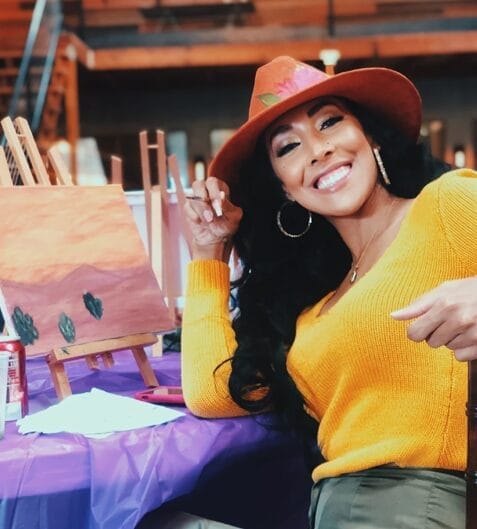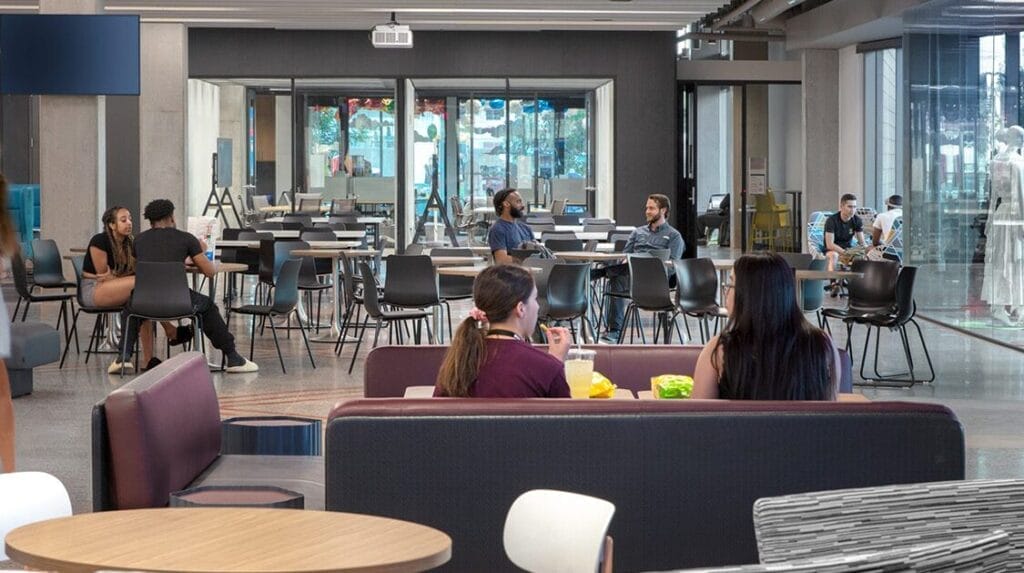
Often, when you have a good idea, it feels like a light bulb turning on in your head. While it is certainly possible to have an “aha” moment that turns into a business, oftentimes, it can feel impossible, or at least intimidating, to find an idea worth pursuing. But don’t sell yourself short–the human mind is a powerful tool. Thinking through your ideas and working through them with others will contribute to the success of your entrepreneurial goals. You might be surprised by your ability to focus on an idea that could become a business or other venture.
Acacia Barnett, the Program Manager for the ASU Blackstone LaunchPad program, knows a lot about business ideas, and not just because of her role supporting ASU and MCCCD students in learning entrepreneurial skills. With an associate degree in business, a bachelor’s degree in Tourism Development and Management, and a master’s degree in Architecture, Acacia has integrated the variety of ideas and topics she’s learned in the classroom into her own business ownership. A licensed esthetician, she opened her own business, followed by a brick-and-mortar store, and even registered a nonprofit, Hattie B. Black Women in Progress.
As a salon suite owner, Acacia provides others space to be their own entrepreneurs, much like what she encourages ASU and Maricopa Community College students to pursue. She describes her multiple business ventures as being a “snowball effect of one thing leading to another.” Acacia is someone who comes up with ideas both frequently and quickly, although, importantly, she admits that not all of them come to fruition.
Acacia shares some of her best tips for identifying and getting feedback on your business ideas.

Photo of Acacia Barnet
How do you decide if something’s a good idea?
You know you’ve hit on something with potential if everything starts falling into place. This looks like sharing an idea or a goal, and listening to everyone’s feedback. Things align and start to work out in ways that suggest the timing is good. This can help make us realize that something needs to happen. There is an urgency and other people who want to back us on pursuing the goal. I’d hit the brakes on a big idea if it didn’t feel like things could come together.
What advice would you give to somebody that says they aren’t an ‘idea person’?
I would tell them to just start thinking of things that they enjoy doing, and what they want to put a lot of work into. If you are interested in making a commitment and you can see the bigger picture to your vision, that is important. Once you just start working and figuring out what you are more curious about and what activities bring you joy, you can use the process of elimination. Be open to different experiences and alternative approaches as well. The idea you choose will probably be something that you wouldn’t even think you’d be doing or enjoy. For instance, I didn’t think that I was going to be doing nonprofit work. But here I am, it’s something that I really enjoy and have been able to really home in on. But if you would have told me in high school, I would have looked at you crazy!
What should someone do if they have an idea but feels like it’s not ready or not good enough to share?
You have to start sharing your ideas with somebody to get some kind of feedback. Talking to others really matters. It helps to get feedback and guidance. I learn a lot from other people sharing what they did or wish they did. That knowledgeable experience can be important and you won’t get it if you hold your idea in. Sometimes I was afraid to share my ideas, including the fear of having others try to copy me, and my mentor was really helpful as a champion for me. My mentor has been in my corner providing that oomph that you need just to keep going, and to know my competition can’t compete where they don’t compare. They aren’t me!
How did you find a mentor?
I met my mentor going to free resource events for nonprofits. My mentor was really great at showing me how to create a proper budget. Once we hit it off, I shared my bigger ideas with her and I just asked, “Will you just hold my hand through this? Because I have this idea, I don’t know how to accomplish it. I don’t even know where to start. But I know I need to do this, and I want to work with somebody who has done something like this before.” Since then, she has given me a map. She told me what I needed to do first and then to come back after I did the work. She gave me step-by-step instructions to make real progress. It’s better to have a mentor to help you and give you sound advice, and of course, the decision is always up to you.
Being an entrepreneur, it is really helpful to listen to experts and get their opinions on what you are doing. It’s helpful to take into account when they are coming from a place of experience.
Where should I look for a mentor?
Look for mentors at networking events, in programs like Venture Devils and other spaces where mentorship is offered to you. What you should look for in a mentor is alignment. See what their feedback is when you share your vision. You should be open to criticism but some excitement really matters and motivates me.
How do I share my idea with confidence that others won’t take it?
Only share your idea with the people you feel confident and comfortable with. You have to kind of make a generic pitch at first. Find a way to summarize your idea without giving too much detail in the beginning–ChatGPT can be helpful with this. Once you start gaining some traction, you’re going to have to start telling people what you’re doing. And you can’t really gatekeep that idea anymore.
Start telling people and know that if someone’s going to take your idea, 9 times out of 10 they’re not going to have the gumption that you have. They’re not going to have the enthusiasm that you have or the drive to do it, and they can try but it probably won’t be as successful. If you are really passionate about this venture, then your competition won’t stand a chance.

Four Easy Steps to Locking Down Your Idea
Acacia’s insights are truly valuable. Building on that wisdom, we’re excited to share additional tips to further develop your idea.
Find Your Passions
Reflect on your passions, interests, and areas of expertise. What activities bring you joy? What subjects could you talk about endlessly? Consider your skills, experiences, and strengths. By being passionate about the work you get to do, you are not only highly motivated but you are also vested in the process.
Find Your Problem
Great business ideas often stem from solving a problem or fulfilling a need in the market. Solving a problem requires conducting thorough market research to identify gaps, pain points, and emerging trends.
Find Your Community
Communities are full of insights, needs, and opportunities just waiting to be explored. Whether through networking events, online forums, or social media groups, connecting with a variety of individuals allows you to identify common pain points and unmet needs. Moreover, your community can serve as a sounding board for brainstorming, validation, and feedback, helping you refine and validate your business ideas.
Find Your Solution
When we think of solutions to issues we tend to think, “How can I solve the most number of issues with one product?” But sometimes the product fits a specific niche for a reason. Rather than seeking a one-size-fits-all remedy, we might discover that addressing specific needs with tailored solutions can lead to significant impact.
Ways to Share Your Ideas
Attend Open Pitch Week: An annual event, Open Pitch Week provides student entrepreneurs an opportunity to pitch their ideas, receive feedback and connect with like-minded students.
Join the Blackstone LaunchPad. LaunchPad leverages a network of subject matter experts and leaders to offer innovation skills training, career advice, resume feedback and interview tips.
Join ASU Venture Devils. Edson E+I Venture Devils offers a full suite of services — from mentorship to access to ASU funding opportunities — to support entrepreneurial success.
Attend an upcoming event. Build your community, learn from successful entrepreneurs and other experts, and support your peers.
Getting Started
We encourage you to find your passions, identify a problem and build your community, especially while you are a college student. Being solutions-oriented can feel different than being the ‘idea person’ and it’s a helpful skill to develop as an aspiring or current entrepreneur.
Edson E+I Institute’s Student Outreach and Engagement provides students and recent graduates with the support they need to continue their entrepreneurial journey or get started. We’re here to support you at any stage of your journey. Get started today!


